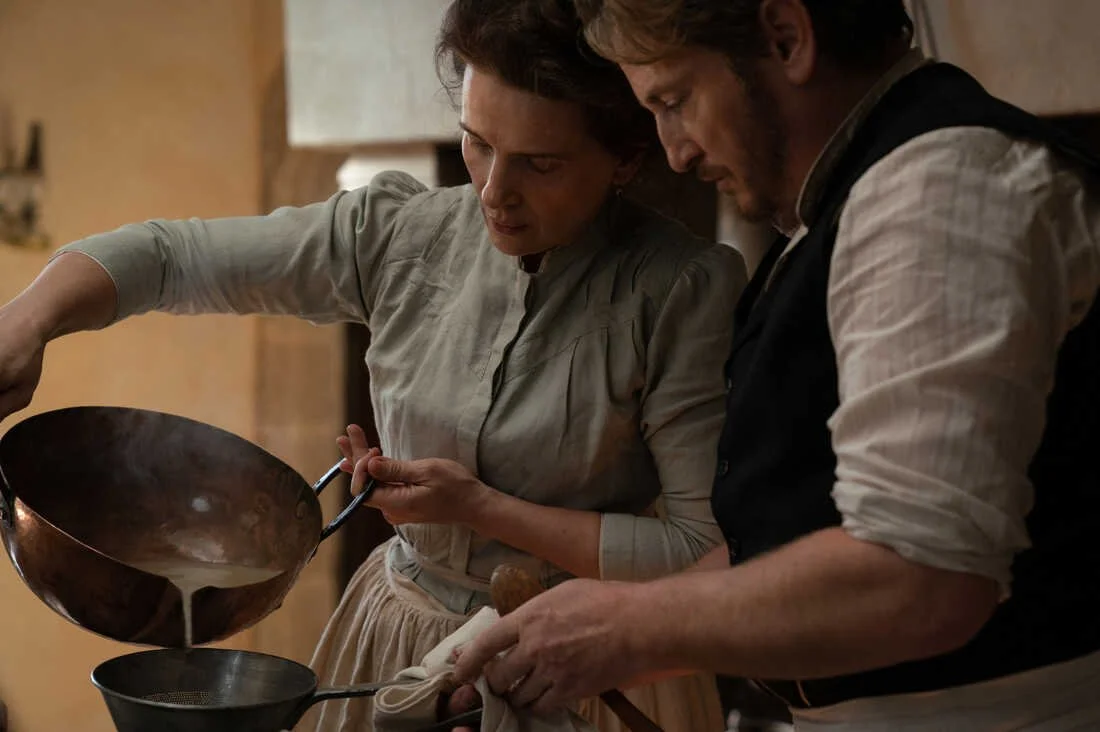THE TASTE OF THINGS
Directing: A
Acting: A-
Writing: A-
Cinematography: A
Editing: A
It’s been said that you shouldn’t watch The Taste of Things on an empty stomach—and that is precisely what I did. And then I sat through this lengthy, gorgeously shot, expertly choreographed opening sequence of an elaborate dinner getting prepared in a large, late-nineteenth-century French kitchen.
Here’s the thing. If you are a carnivore, you might have greater need to heed such a warning: there is a lot of meat and seafood prepared in this movie. I am, however, a vegetarian—I don’t even eat seafood. I could appreciate the vividly shot food, clearly actually cooked on set, on a purely aesthetic level, but it certainly didn’t have me salivating.
Here’s what it did do. It made me think, a lot, about the way we eat our food. It made me long for a meal prepared with such intricate care, from ingredients sourced from the garden right outside the door. The film’s opening shot, in fact, is of Eugénie (a luminescent Juliette Binoche, still a genuine stunner at age 59) harvesting produce straight out of the dirt. We throw phrases around like “farm to table” as though it’s a marketing concept, and then we witness it occurring onscreen in this movie, almost in real time. And here, in the real world, 140 years after the setting of our movie, we pass our days eating food made quickly or cheaply or, in most cases, both.
The Taste of Things is populated with characters for whom flavor is more important than anything. I marveled at the technical proficiency already achieved by the 19th century, the myriad combinations of ingredients and cooking techniques, and the amount of time that it takes—and took—to master all these dishes.
As I said, the meat based dishes—beef, veal, fish, you name it—still failed to make me salivate, in ways I am certain it will most audiences. And then Eugénie whips up this Baked Alaska dish and I nearly cried with desire: Holy fuckballs that looks amazing! And I don’t even like meringue. The men Eugénie serves this dessert to discuss the physics of how the ice cream stays frozen inside, and I was rapt. This was one dish with meringue I could imagine using as skin cream. I wanted to bathe in it.
The Taste of Things is about much more than vividly shot food preparation, of course. At its heart, it is a love story, between Eugénie, a longtime cook, and Dodin Bouffant (Benoît Magimel), the restauranteur Eugénie worked for for many years. They now live together in a kind of perpetual romance, Dodin regularly proposing to her, and Eugénie regularly insisting she prefers things as they are. Their love and affection is quite overtly represented in the deeply rooted history and skill in the food they share. This includes both cooking and eating it, although Eugénie does most of the cooking.
There is a bit of sadness thrown in, and I won’t spoil exactly what that is, although it gets alluded to pretty early on, in the middle of the aforementioned, extended opening sequence. It’s easy to focus on that sequence, because of the incredible blocking and choreography and camera work, but most scenes in this film involve cooking, and without exception the food is shot with a cozy, loving eye. Beyond the focus on the food, the story is deceptively simple. But it stays with you.
There is a somewhat curious separation of genders in this film, and the heavy focus on Binoche notwithstanding, I kind of wish there were more women in it. Besides Eugénie, the only significant female characters are two younger cooks who work with her: Violette (Galatéa Bellugi), who evidently has relatively mediocre still; and Violette’s niece, Pauline (Bonnie Chagneau-Ravoire), who has an astonishing, precocious talent for gastronomy. Dodin, for his part, has a group of about five men friends who populate many scenes, often to pontificate on the prepared food or to provide support to Dodin, as needed.
But, it all comes back to Eugénie and Dodin, every other character serving their story. One of the great many things I love about The Taste of Things is the way it naturally veers away from any of the typical film tropes. Just because of the way I’ve been conditioned by decades of movie watching, I kept expecting one of the apprentice cooks to trip while climbing the many staircases in the house, or for one of the men to creep on young Pauline. But, nothing of the sort happens in this story, which is only about two character who are, as Dodin puts it, “in their autumn years,” and their earnest devotion to each other. Sometimes the simplest stories are the most moving and beautiful, and this is certainly one to savor.
Don’t insult this movie by eating cheap popcorn while you watch it!

